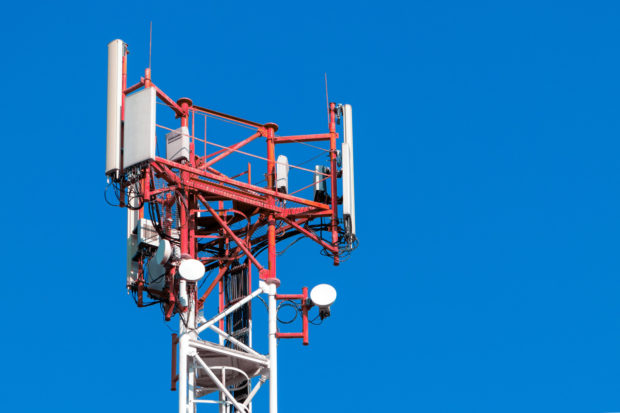
File photo of a telco tower.
MANILA, Philippines — The National Telecommunications Commission (NTC) bared it is in talks with the Department of Public Works and Highways (DPWH) to amend existing rules on the right-of-way, to allow telecommunication companies build cell sites faster.
NTC Deputy Commissioner Edgardo Cabarios said on Monday that they have sent a letter to DPWH Secretary Mark Villar about possible amendments to the Department Order No. 73, series of 2004, in accordance with President Rodrigo Duterte’s directive to make internet speeds faster.
Internet speeds have been a major issue pointed out by Duterte during his last State of the Nation Address (Sona), as the country grapples with the COVID-19 pandemic — forcing more work-from-home scenarios and online classes.
“With the surge in internet usage during the COVID-19 pandemic and the directive of President Duterte for telcos to fast-track improvements of their services by yearend, the [NTC] recently wrote [DPWH] Secretary Mark A. Villar to consider the proposed amendments to the existing rules and regulations of DPWH Department Order (D.O.) 73 (s. 2014) on the right-of-way,” Cabarios said.
“Right-of-way issues remain to be a principal cause of delays to telcos’ nationwide roll-out plans preventing them from building the critical backbone and last-mile connectivity,” he added.
As of now, Cabarios said that the said department order “prohibits posts for cable of phones and mobile service providers along all national roads,” making developments in the telco industry generally slower, which is also seen as a factor in slow internet speeds.
During the lockdowns due to the COVID-19 health crisis last March to May, internet speeds took a great hit as more people went online in the advent of stay-at-home policies and greater telecommuting jobs.
While internet speed testing firm Speedtestby Ookla said last August that internet levels in the country were returning to pre-pandemic levels, the Philippines still ranks below several countries — including Asia Pacific neighbors — in terms of fixed broadband and mobile data speeds.
The slow internet was a major talking point in Duterte’s Sona, with him even warning telcosthat they may face expropriation, or government controlling their businesses, if they fail to improve their internet speeds by the end of the year.
The third telco, Dito Telecommunity— a consortium between Udenna Corporation, its subsidiary Chelsea Logistics Corporation, and Chinese state-owned China Telecommunications Corporation — was supposed to roll out early this year but the pandemic scaled down their operations.
Cabarios said that the amendments to the right-of-way issues were made by a technical working group that was composed of people from NTC, DPWH, and the Department of Information and Communications Technology (DICT).
“Through a Memorandum of Agreement (MOA) signed during the First Philippine Telecoms Summit in 2017, the [DICT], DPWH and NTC agreed that there was a need to amend or revise the D.O. to eliminate barriers to the expansion of telecommunication services and facilities in the country as well as to effectively roll-out the ICT infrastructure,” Cabarios explained.
“The amendments to DPWH D.O. 73 is also one of the vital considerations of the newly-created Telecommunications Monitoring Group for the improvement of telecommunications services, a multi-agency body comprised of the DICT, Department of Interior and Local Government, Presidential Anti-Crime Commission, Presidential Commission on Good Government, Anti-Red Tape Authority and the Office of the Special Assistant to the President,” he added.